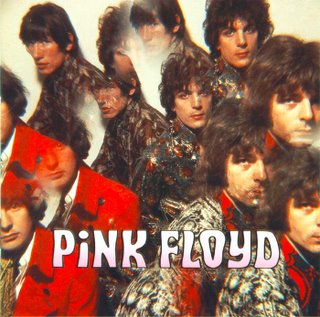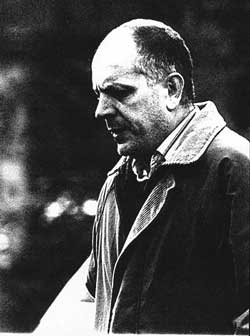 Months after posting in a nostalgic sense about the wonderful world of Ultraman, the powers that be have elected at last to release the original series on DVD ... well, the first twenty episodes, at least.
Months after posting in a nostalgic sense about the wonderful world of Ultraman, the powers that be have elected at last to release the original series on DVD ... well, the first twenty episodes, at least.Let's get the technical stuff out of the way first: the presentation is fairly good throughout, especially with the factors of time and storage considered, though there are some issues with the sound, in particular the dubbed English dialogue switching irritatingly to Japanese at the drop of a hat without automatically triggering the subtitling (I had to manually activate this function on a few occasions). The extras, sadly, are largely inconsequential: a dull, amateur-quality recording of a conversation with the three principal voice actors who dubbed the series for English television, a more informative (though very dry) slideshow walk-through introducing of the monsters featured during this batch of episodes, and finally the English-language opening credits for the show.
As was the case during my marathon week of Johnny Sokko And His Flying Robot on a home-made DVD compilation a few months ago, watching Ultraman Vol. 1 over the last few nights was a rather illuminating experience, as many newer impressions of the show have surfaced since the last time I watched it (which was somewhere around 25 or more years ago). It was also impossible not to contrast the two series as the series wound onwards, and I am pleased to report that Ultraman quickly overpowered Sokko in nearly all fields of comparison.
The most immediate impression I got from watching these DVDs was what a weirdly schizoid show Ultraman could be as it occasionally blended goofball slapstick humor with surprisingly heavy existential plot developments, not to mention an unexpected, not-quite-psychedelic-but-definitely-mid-1960s surreal twist noticeable in the style of the later episodes.
 Despite some genuinely creepy monsters and set-pieces scattered around the first 20 shows, Ultraman comes off as a lot more overtly kid-aimed than I'd remembered. I realize that this isn't exactly an amazing observation concerning a show that features stunt performers in silly rubber monster suits getting their asses kicked on a weekly basis by another guy in a skin tight silver getup, but bear with me a bit. Unlike Johnny Sokko, whose characters were taciturn and businesslike with only rare occasions where they engaged in comedy, there are times watching Ultraman when you wonder exactly who selects agents for Science Patrol duty, especially if such clods as Ito (an electronics whiz who comes off like a Japanese version of Jerry Lewis), Irashi (a hot-headed dolt who wants to blast everything in sight with his two-handled ray gun), and the obligatory "troublemaking kid character" Hoshino somehow made the grade.
Despite some genuinely creepy monsters and set-pieces scattered around the first 20 shows, Ultraman comes off as a lot more overtly kid-aimed than I'd remembered. I realize that this isn't exactly an amazing observation concerning a show that features stunt performers in silly rubber monster suits getting their asses kicked on a weekly basis by another guy in a skin tight silver getup, but bear with me a bit. Unlike Johnny Sokko, whose characters were taciturn and businesslike with only rare occasions where they engaged in comedy, there are times watching Ultraman when you wonder exactly who selects agents for Science Patrol duty, especially if such clods as Ito (an electronics whiz who comes off like a Japanese version of Jerry Lewis), Irashi (a hot-headed dolt who wants to blast everything in sight with his two-handled ray gun), and the obligatory "troublemaking kid character" Hoshino somehow made the grade.Then again, the whole reason I watched this show as a kid was the monsters, and watching these epic battles between Ultraman and his foes is a massive giggle not altogether different from a pro wrestling match (with some good ol' fashioned sumo moves here and there for color). While Johnny Sokko's Giant Robot fought in pretty much the same clunky way you'd expect a robot to fight, Ultraman was a nimble, graceful, sometimes playful figure in the ring who floated like a butterfly and stung like a bee. I will also add that the carnage is often spread equally by the battling titans, as Ultraman also seems to cause just as much damage to balsawood Nipponese infrastructure as his nemesis in any given battle. It was also surprising to note how quickly most of these fights were resolved: Ultraman was able to dispatch many of his assailants by simply utilizing his badass Specium Ray after a few moments of spirited leaping about and a few strategically-placed karate chops.
Another thing that struck me was that the production values on Ultraman seemed much higher than those of Johnny Sokko in nearly all areas, from the music to the use of location shooting and generally more creative monster design (not only were many of Sokko's adversaries rather cheesy in comparison, but the show's creators gleefully re-used their monsters two and three times over during the show's run).
I'll conclude with what is for me the most interesting difference between the two series: the tone of the shows as a whole. The U.N.I.C.O.R.N. organization were effectively at war with the Gargoyle Gang throughout the run of Johnny Sokko as every single foe faced by the Giant Robot was a stooge of the bad guys. With Ultraman, the enemies are spawned by nuclear accidents, radiation exposure, or just happen across the Earth from the depths of space and time, and not all of them had what could be construed as "evil" intentions. Thus, there are a few episodes of Ultraman that end on a surprisingly melancholy note as the defeated monsters are given a mournful musical sendoff rather than a rousing fanfare of victory.



